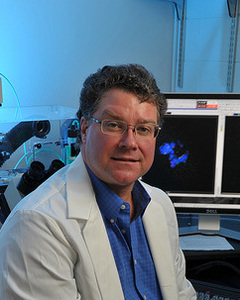Kevin Vaughan

Associate Professor of Cell Biology
University of Notre Dame
Kevin Vaughan’s laboratory is deciphering the “spindle assembly checkpoint,” a biochemical system that monitors chromosome segregation and reduces the frequency of mistakes in this process. The fidelity of this surveillance system is especially important for cells that divide frequently because errors lead to loss of tumor suppressor genes and tumor formation. Vaughan’s research is focused on the molecular components of the checkpoint and the signaling pathways that regulate normal cell division.
Using mass spectrometry of proteins that mediate chromosome movement, the group has identified a novel set of proteins regulated by a molecular switch known as phosphorylation. These phosphorylation events are driven by proteins known as kinases and phosphatases, enzymes identified as the most promising targets for chemotherapy drugs. Because work in the Vaughan laboratory reveals the molecular consequences of treatment with these chemotherapy drugs, cancer researchers are able to determine combinations of drugs that improve efficacy and reduce side effects. Furthermore, these studies justify the development of new generation drugs with increased specificity and potency.
The specific investigations in the laboratory include breast cancer, leukemia and occupational exposure to carbon nanofibers. The latter represents a developing industrial problem similar to asbestos exposure.
A multifaceted approach is applied to these cancer problems, including biochemistry of phosphorylation, pharmacological manipulation of kinases and phosphatases, molecular genetics and sophisticated imaging of cell cycle progression.